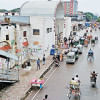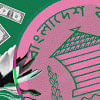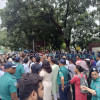Internet blackout wallops life and living
A countrywide internet blackout dealt a massive blow to the lives of Bangladeshis, upending their digital lifestyle and leaving many businesses staring at huge financial losses.
The complete non-availability of internet has left people without social media, internet-based voice and video calls, online transactions and many more essential services for three days.
Mobile financial services (MFSs), which have become the lifeblood for crores of people, have come to a halt, leaving many with no money in hand.
Export and import activities at sea and land posts are also paused as the entire process depends on the internet.
This scenario delivered the wrong message to the world, portraying Bangladesh as an unreliable business partner.
The digital commerce sector, which includes e-commerce, f-commerce, logistics and ride-hailing services, is facing losses of $5 million every day, said Fahim Ahmed, CEO of ride-hailing company Pathao.
From logistical support to money collection, everything is being affected due to the absence of internet, he said.
Russell T Ahmed, president of the Bangladesh Association of Software and Information Services (BASIS), said: "Many of my association members called and cried as they fear this prolonged internet outage may destroy their businesses in the blink of an eye."
As the internet was suspended without any prior notice, IT firms and freelancers could not notify clients about the outage earlier, which may also lead to a downgrade Bangladesh's rating in the global IT services industry, he added.
He urged the government to restore internet services at least for the export-oriented IT businesses and other firms as soon as possible.
Md Arafat, a resident of Dhaka, said he tried multiple times on July 20 to top-up his phone through MFS accounts, but failed. Local flexiload shops also offered no solution.
Officials of telecom operators said they are losing around Tk 35 crore to Tk 40 crore in revenue each day due to the outage of mobile internet services.
The internet blackout started in Bangladesh on July 16, when the telecom regulator ordered operators to shutdown 4G internet services in over 50 university areas amid quota reform protests.
The next day, the government, utilising its own technology, shutdown mobile internet across the country.
At the time, Zunaid Ahmed Palak, the state minister for ICT, said 4G was shut down by the government to help law enforcers tackle the existing situation in the country.
On July 18, a fire broke out in the building of the Department of Disaster Management in the capital's Mohakhali area, damaging the internet transmission lines of some data centres hosted in adjacent buildings.
As a result of that fire, the country's broadband users were getting internet, but it was a little bit slow.
The same day, at around 8pm, officials of the Internet Service Providers Association of Bangladesh (ISPAB) said the fire may eat away at 30-40 percent of bandwidth supply, leaving some users disconnected and many with slow internet.
But at around 9pm, users across Bangladesh faced a complete broadband blackout, leaving them totally disconnected from the outside world.
The government had ordered international terrestrial cable and international internet gateway companies to stop supplying bandwidth to the internet service providers, which provide internet to homes and businesses, said multiple industry players seeking anonymity.
However, the Bangladesh Telecommunication Regulatory Commission (BTRC) said miscreants had set ablaze a data centre in Mohakhali, which had led to the internet disruption.
On July 20, the BTRC and the ISPAB said they needed more time to repair the damaged data centre and transmission lines.

 For all latest news, follow The Daily Star's Google News channel.
For all latest news, follow The Daily Star's Google News channel. 








Comments